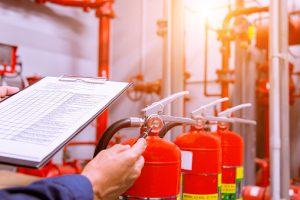Saving Lives and Preventing Catastrophic Fire Damage: What to Look for
 Fire departments across the nation respond to about 13 calls from business and industry every hour, according to the National Fire Protection Association, in addition to the average of 43 calls from residential properties that come in hourly.
Fire departments across the nation respond to about 13 calls from business and industry every hour, according to the National Fire Protection Association, in addition to the average of 43 calls from residential properties that come in hourly.
When it comes to workplace fire hazards in Rhode Island and Massachusetts, Occupational Health and Safety Online the following factors:
- Clutter: Dust, shavings and waste in work areas.
- Improper Fire Extinguishers: Fire extinguishers are not designed for all types of fires.
- Electrical Issues: Extension cords, daisy-chained connections, overloaded outlets and blocked electrical panels.
- Inadequate Sprinkler Clearance: Items stored too close to sprinkler heads spray and the system’s ability to douse an area.
- Improperly Stored Chemicals: Hazardous substances that are not properly stowed, handled and utilized.
- Open Waste Containers: Lids not on containers that prevent the unintentional mixing of waste and dangerous vapor emissions.
- Improperly Rated Appliances and Tools: Household appliances, not industrial-rated tools, used for workplace tasks.
- Defective Detectors: Smoke alarms, carbon dioxide detectors and hazardous gas sensors not tested and, when necessary, calibrated. Emergency exit lighting, alarms and signs should be checked periodically.
- Blocked Aisles: Emergency exit paths not always kept clear.
- Unmanaged Hot Work: Safety procedures for welding, cutting, brazing and other hot work not followed.
Fire Dangers Far Too Common
Burn injuries occur under countless work-related circumstances, ranging from construction sites and restaurant kitchens to building fires and radiation exposure. Less obvious are fire injuries caused by exposure to toxic spills, hazardous chemicals, gas leaks and dangerous dusts. These pose a risk for workers at hardware stores, home supply stores, factories, gas stations, hospitals, pharmacies, and even schools, government buildings and in public transit jobs.
Symptoms include:
- Dizziness, headaches, fatigue
- Diarrhea, nausea, vomiting
- Chemical burns in the lungs and on skin
- Difficulty swallowing
- Itchy, burning eyes
- Racing heart or palpitations
- Fever
Don’t Get Burned by Your Employer, Too
Burn injuries can be painful, debilitating and disfiguring, requiring extensive treatment or preventing the victim from ever returning to work. While victims are eligible for worker’s compensation benefits, the claims process is complex. A company attorney may try to blame the injury on you or downplay its significance. An insurance company may pressure you into accepting a financial settlement that comes nowhere close to meeting your needs because they know you are desperate. Furthermore, proving you’ve been injured by hazardous fumes or chemicals can be particularly difficult without the help of experts.
The workers’ compensation attorneys at the Law Offices of Deborah G. Kohl have been handling cases just like yours in Rhode Island and Massachusetts for 35 years. Their legal team will assist you in every step of the process, from filing your claim to negotiating with insurance companies. They have offices in Providence, Rhode Island, and Fall River and Foxboro, Massachusetts. Contact them today for a free, no-obligation, confidential consultation.

 Manufacturing usually involves highly repetitive job functions. According to
Manufacturing usually involves highly repetitive job functions. According to